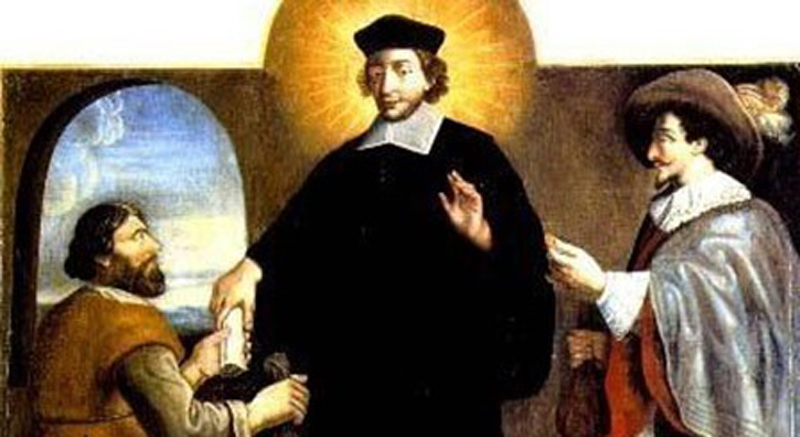(1253-1303)
Probably better known as St. Ives in this country, our saint was born in Kermartin near Treguier, Brittany.
In 1267, Ivo was sent to the University of Paris, where he graduated in civil law. While other students partied, Ivo studied, prayed, and visited the sick. He also refused to eat meat or drink wine. Among his fellow-students were the scholars Blessed Duns Scotus and Roger Bacon.
Ivo went to Orléans in 1277 to study canon law under Peter de la Chapelle, a famous jurist who later became bishop of Toulouse and a cardinal. On his return to Brittany, having received minor orders he was appointed an “official,” the title given to an ecclesiastical judge of the archdeaconry of Rennes (1280). He protected orphans and widows, defended the poor and rendered fair and impartial verdicts. It is said that even those on the losing side, respected his decisions. Ivo also represented the helpless in other courts, paid their expenses and visited them in prison. He earned the title “Advocate of the Poor.” Although it was common to give judges “gifts,” Ivo refused bribes. He often helped disputing parties settle out of court so they could save money.
Ivo continued to study scripture and joined the Third Order of St. Francis sometime later at Guingamp. Ivo was ordained to the priesthood in 1284. He continued to practice law and once, when a mother and son could not resolve their differences, he offered a Mass for them. They immediately reached a settlement.
St. Ivo is the patron of lawyers. As a result, many law schools and association of Catholic lawyers have taken his names. For instance, the Society of St. Yves in Jerusalem (a Catholic Centre for Human Rights and Legal Aid, Resources and Development), the Conférence St. Yves in Luxembourg (the Luxembourg Catholic Lawyers Association), or the Association de la St. Yves Lyonnais.
Ivo was canonized in June 1347 by Clement VI at the urging of Philip I, Duke of Burgundy. At the inquest into his sanctity in 1331, many of his parishioners testified as to his goodness, that he preached regularly in both chapel and field and that under him “the people of the land became twice as good as they had been before.” The connection between religion and good behavior was especially stressed in his sermons and he is reported to have “chased immorality and sin from the village of Louannec”.
Ivo is often represented with a purse in his right hand (for all the money he gave to the poor during his life) and a rolled paper in the other hand (for his charge as a judge). Another popular representation of Ivo is between a rich man and a poor one. The churches of Sant’ Ivo alla Sapienza and Sant’ Ivo dei Bretoni in Rome are dedicated to him.
Adapted by A.J. Valentini from: A.& Posts, V. A. (2018, May 18). – 19 May – St Ivo of Kermartin (1253–1303) “Advocate of the Poor.” AnaStpaul. https://anastpaul.com/2018/05/19/saint-of-the-day-19-may-st-ivo-of-kermartin-1253-1303-advocate-of-the-poor/
